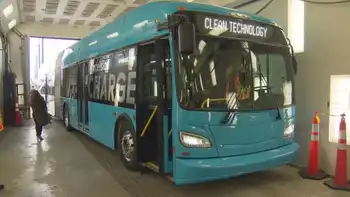Hybrid vehicles join Houston UPS green fleet
STAFFORD, TEXAS - UPS has expanded its fleet of alternative-fuel vehicles with the deployment of 25 next-generation hybrid electric delivery trucks to Houston.
At the UPS facility in Stafford, Texas, Gov. Rick Perry was on hand to welcome the new vehicles to Houston. He was joined by state Sen. Tommy Williams and state Rep. Elect Ron Reynolds.
Currently, 50 UPS hybrid electric vehicles HEVs operate in Atlanta, Dallas, Houston and Phoenix. The 25 trucks deployed here are part of 200 new HEVs deployed recently to eight U.S. cities. The 200 new trucks will operate in Austin, Houston, Philadelphia, Chicago, Washington, D.C., Long Island, Minneapolis and Louisville.
“We’re proud of this large HEV deployment to major cities in the United States,” says Bob Stoffel, UPS senior vice president of Supply Chain Strategy, Engineering and Sustainability, “This technology, where properly used, can yield a 35 percent fuel savings, the equivalent of 100 conventional UPS delivery vehicles.”
The 200 new HEV package cars are expected to reduce fuel consumption by roughly 176,000 gallons over the course of a year compared to an equivalent number of traditional diesel trucks. The hybrids also should reduce by 1,786 metric tons the amount of CO2 gases released annually into the atmosphere.
The new hybrid power system uses a conventional diesel engine combined with a battery pack, saving fuel and reducing pollution-causing emissions. The small diesel is used to recharge the battery pack and to add power when necessary.
HEVs use regenerative braking. The energy generated from applying the brakes is captured and returned to the battery as electricity. The combination of clean diesel power and electric power, supplemented by regenerative braking, allows dramatic improvements in fuel savings and emissions reductions.
The HEV fleet features a chassis from Freightliner Custom Chassis Corporation and a hybrid power system from Eaton Corporation. The external truck bodies are identical to UPSÂ’ other signature brown trucks, although they feature additional labeling identifying them as hybrid electrics.
The trucks use lithium ion batteries, which offer a faster re-charging capability and last longer than previous generation HEV batteries. Additionally, these vehicles are much quieter than conventional UPS trucks.
The UPS alternative fuel fleet is a diverse one with multiple technologies, including compressed natural gas, liquefied natural gas, propane, electricity and hydraulic hybrid technology. Since 2000, the alternative-fuel fleet has traveled more than 165 million miles.
UPS was the first package delivery company to introduce a HEV into daily operations with a research program it launched in early 1998.
In 2001, the company deployed the industry's first hybrid electric package car into regular service in Huntsville, Ala., where the truck worked a 31-mile route with about 160 pickups and deliveries each day. UPS then introduced its second generation HEV to its Kalamazoo, Mich., fleet in 2004, while at the same time deploying the first hydrogen fuel cell delivery trucks into regular service.
“The wide variety of technologies in our green fleet is indicative of UPS’ ‘rolling laboratory’ philosophy to energy efficiency and reduced fuel consumption,” Stoffel says. “Our goal is to reduce dependence on fossil fuels, but there is no silver bullet technology to achieve this. This dependence will rely on a multi-modal approach.”
Related News

SaskPower reports $205M income in 2019-20, tables annual report
REGINA - SaskPower presented its annual report on Monday, with a net income of $205 million in 2019-20.
This figure shows an increase of $8 million from 2018-19.
“Reliable, sustainable and cost-effective electricity is crucial to achieving the economic goals laid out in the Government of Saskatchewan’s Growth Plan and the emissions reductions targets outlined in Prairie Resilience, our made-in-Saskatchewan climate change strategy,” Minister Responsible for SaskPower Dustin Duncan said.
In the last year, SaskPower has repaired and upgraded old infrastructure, invested in growth projects and increased grid capacity.
“During the past year, we continued to move toward our target to reduce carbon dioxide…




